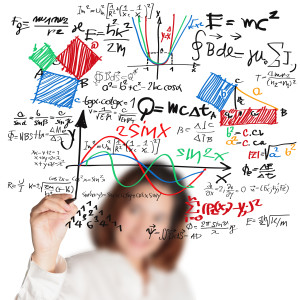 There are a multitude of opinions on the topic of calculators, ranging from: “I learned math without a calculator” to “what happens if children are dependent on calculators and there isn’t one around” to “children should not move on to higher level math until they can do basic computations mentally.” I am going to explain why I believe these opinions are keeping our students from being comfortable learning and using math. Following are my responses to common arguments against calculator use:
There are a multitude of opinions on the topic of calculators, ranging from: “I learned math without a calculator” to “what happens if children are dependent on calculators and there isn’t one around” to “children should not move on to higher level math until they can do basic computations mentally.” I am going to explain why I believe these opinions are keeping our students from being comfortable learning and using math. Following are my responses to common arguments against calculator use:
1. I learned math without a calculator.
Most of the people that I have heard make this statement against calculators went to school in the 1950’s,’60’s and 70’s. The older members of this group (myself included) were educated at a time where well paying factory jobs were available immediately after high school graduation. Few of those jobs required the use of higher level math to become employed. But today our students need higher level math and problem solving skills in order to succeed in many jobs of the present and future.
2. What do children who are dependent on a calculator do when one is not available?
Calculator use in the classroom is not an all or nothing situation. If you allow students to use calculators to help them solve multi-step problems that would take a class period to solve by hand you are not making them calculator dependent. You are teaching them to use a tool to assist them in solving a problem. At the same time, it is essential to have times when they are required to do mental math as well as show paper and pencil problem solving skills. If part of our job is to prepare students for the world of work we must ask ourselves are we doing our job if we are not teaching our students to use the technology available in almost every business they will enter.
3. Children should not move on to higher level math until they can do basic computation mentally.
I must admit that when I first started teaching I took this statement as educational gospel. But early in my career I had the opportunity to attend a problem-solving workshop that would “pay” me with a classroom set of 4 function calculators. Even during the workshop I was somewhat skeptical about using them with my students but I found the workshop problems interesting so I agreed to test both the activities and the calculators in my classroom. Much to my surprise my “weakest” students were able to see alternative solutions to many problems that I never thought of. These “weak” students had been freed from the bonds of their lack of basic computational skills to be able to think mathematically using calculators.
Let me also add under this issue something I learned later in my career. Most of us know that dyslexia exists but did you know that dyscalculia also exists? Dyscalculia is a broad group of mathematical learning disabilities which sometimes include the inability to memorize basic computational facts. Do we really want to deny a child with a mathematical learning disability from higher level math classes just because he might need to use a calculator for computation?
In conclusion, I would like to suggest that there is a need for calculator use in the classroom. It must be approached thoughtfully and include mental math, paper and pencil computations as well as the use of calculators because our future depends on workers who can successfully problem solve.




Leave a comment